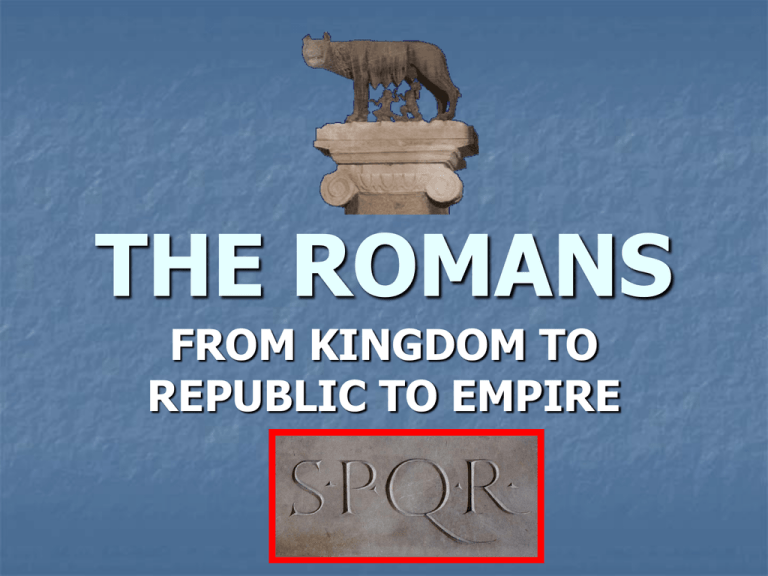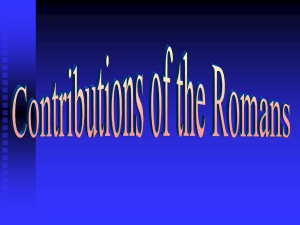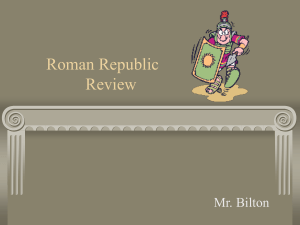THE ROMANS FROM KINGDOM TO REPUBLIC TO EMPIRE
advertisement

THE ROMANS FROM KINGDOM TO REPUBLIC TO EMPIRE EARLY ROME The Etruscans Probably migrated from Anatolia Dominated Italy from the 8th to 5th centuries B.C.E. Arch, religion, alphabet, early traditions given to Rome Declined, attacked by Gaul and defeated by Greek fleets Romulus and Remus City-states were constantly at war Similar in own way to Greek society Legend: twins rescued by a she-wolf Founded Rome in 753 B.C.E. Indo-European migrants settled in Italy from 2000 B.C.E. Came from Latins, a tribe of the Italics The kingdom of Rome A small kingdom on the Tiber River, ruled by monarchies Easy access to the Mediterranean, trade routes led to Rome Agriculture, warfare were typical Society dominated by aristocracy called patricians THE WORLD OF EARLY ROME EARLY ROMAN REPUBLIC Establishment of the Republic Rome nobility deposed the last Etruscan king in 509 B.C.E. Republican constitution Included two consuls: civil and military Consuls elected by an assembly dominated by the patricians The Senate advised the consuls and ratified major decisions Senate and consuls represented the interests of the patricians Conflicts between patricians and plebeians Plebeians' threat to secede from Rome Patricians granted plebeians the tribunes Tribunes' power to intervene and veto decisions Tribunes dominated Roman politics, early 3rd century B.C.E. In times of crisis, ruled by short-term dictatorship Elected for six month term Given unlimited power ROMAN REPUBLICAN GOVERNMENT Monarchical Aristocratic Democratic 2 Consuls and Magistrates Senate (Senators) Assembly of Tribes (10 Tribunes) Directed government Control army Acted as judges Could issue edicts Acted as chief priest Controlled state budget Could pass laws Approved/rejected laws; Decided on War Tribune could veto actions of magistrate Acted as final court Basis of power: possess imperium, the right to rule need for leadership Basis of power: members were richest men in Rome. Basis of power: provided most of the soldiers Limits on power: one year term each could veto Limits on power: could not control army; needed majority as soldiers. Limits on power: Could not suggest laws; often paid as clients by the elite EXPANSION OF REPUBLIC The Legion gave Rome incredible power Consolidated position in Italy BY 4th centuries B.C.E. Battled descendants of Phoenicians for control of Sicily, Spain Built navy to challenge Carthage Defeated Carthaginians and conquered Africa Conflicts with Antigonids and Seleucids, Conflict with Italics and Greeks in S. Italy New Roman colonies founded – with Roman rights Created alliances with Italics – given Latin rights Expanded Roman territory to include choice lands Makes local aristocrats Roman citizens, allow to retain their lands The Punic Wars (264-146 B.C.E.) Roman military formation of 5,000 men Extremely organized; all officers well trained Shields, swords (two edged) were revolutionary Subunits could operate on own without central commands Five major wars Created alliances as with Italy, colonies of Roman settlers Rome became a preeminent power in the Mediterranean ROMAN LEGION THE PUNIC WARS Hannibal’s Elephants Hannibal Scipio Africanus THE END OF THE REPUBLIC Social Tension Long wars ruined most small farmers During war could not plant or harvest, debts increased Forced to sell land to patricians, move to city as day laborers Poor often sold into slavery Increased slavery more profitable than hiring Roman poor Migration of poor to cities produced lawlessness The Gracchi brothers Tiberius Gracchus represented interests of Rome's lower classes Served as a tribune, passed a law that set limits for landholding Assassinated in 132 B.C.E. The younger brother, Gaius Gracchus, continued the reform Was branded as a outlaw, killed by mercenaries Republican government could no longer maintain power balance Marius and Sulla Gaius Marius recruited a private army from landless residents Conservative aristocratic class supported Lucius Cornelius Sulla Both raised troops illegally under Roman law Civil War Marius seized Rome in 87 B.C.E. Sulla seized Rome in 83 B.C.E. after Marius died, 5 years of terror EXPANSION OF THE REPUBLIC FOUNDATION OF EMPIRE Julius Caesar Marius's nephew Favored liberal policies and social reform Gained fame by sponsoring public spectacles Conquered Gaul, became more popular First Civil War Seized Rome in 49 B.C.E. Claimed the title "dictator for life," 46 B.C.E. Social reforms and centralized control Assassinated in 44 B.C.E. Second Civil War to Avenge Caesar’s murders Augustus Octavian, nephew of Caesar, brought civil conflict to an end The Senate bestowed upon him the title Augustus, 27 B.C.E. Augustus's administration A monarchy disguised as a republic Preserved traditional republican forms of government Took all the power into his own hands Created a new standing army under his control The imperial institutions began to take root EMPIRE AT ITS HEIGHT THE PAX ROMANA Roman expansion had effects in Gaul, Germany, Britain, Spain Romans sought access to resources Built legionary camps to defend; Roman officials ran provinces Provincial elite began to build estates and control resources Came from two sources: Roman colonists, local ethnic elites Elites became largely Romanized Cities emerged, roads built, common currency, laws Allowed locals to retain customs, traditions if paid their taxes The pax romana Meant "Roman peace," lasted for two and half centuries Facilitated trade and communication World linked from Mesopotamia to Atlantic Ocean Roman roads Roman engineers as outstanding road builders Roads and postal system linked all parts of the empire Roman law Tradition: Twelve Tables enacted in 450 B.C.E. Principle: innocent until proven guilty Judges enjoyed great discretion ROMAN ROADS TRADE & URBANIZATION Commercial agriculture Mediterranean trade Owners of latifundia focused on production for export Commercial agriculture led to economic specialization, integration Slavery preferred over labor saving devices and paid labor Sea-lanes linked ports of the Mediterranean Roman navy kept the seas largely free of pirates The Mediterranean became a Roman lake The city of Rome Wealth of the city fueled its urban development Statues, pools, fountains, arches, temples, stadiums First use of concrete as construction material Rome attracted numerous immigrants City attractions Public baths, swimming pools, gymnasia Enormous circuses, stadiums, and amphitheaters Other Cities Most large cities were in Eastern part of empire Eastern cities largely dominated by Greeks Cities include Alexandria, Antioch, Athens, Pergammum, Thessalonika CLASSICAL ROME ROMAN FAMILY, SOCIETY The pater familias Roman family: all household members living together Pater familias or "father of the family" ruled Women wielded influence within their families Many women supervised family business, estates Wealth and social change Rich classes built palatial houses, lavish banquets Cultivators, urban masses lived at subsistence level Poor classes became a serious problem in Rome and other cities No urban policy developed, only "bread and circuses“ Merchants tolerated but not given much social recognition Slavery Slaves - 1/3 of Roman population Chained together in teams, worked on latifundia Spartacus's uprising in 73 B.C.E. Working conditions for city slaves were better Epictetus, an Anatolian slave, became a prominent Stoic philosopher Urban slaves could hope for manumission The gladiator or a slave trained to fight in the arena was popular ROMAN WORLD VIEW Veritas and Gravitas Roman Polytheism Early deities: Jupiter, Mars, Ceres, Janus, Vesta Newly adapted deities: Juno, Minerva Borrowed, co-opted foreign deities into pantheon Religion was agricultural, state oriented, important to family Very little emotional attachment to gods Greek influence represented by Philosophy Honesty and Seriousness Symbolized Roman cultural values Stoicism appealed to Roman intellectuals Cicero (106-43 B.C.E.) established Stoicism in Rome Epictetus and Marcus Aurelius wrote extensively Religions of salvation and Cults Flourished in Rome and the Mediterranean basin Roman roads served as highways for religious spread Mithraism Mithras, a god of sun and light in Zoroastrian mythology Roman soldiers adapted it, associated it with military value Moral teaching of Mithraism, only for men Goddess Cybele and goddess Isis were also popular JUDAISM & CHRISTIANITY The Jews and the empire The Essenes Charismatic Jewish teacher, taught devotion to God, love for human beings The teaching "the kingdom of God is at hand" alarmed the Romans Crucifixion in early 30s C.E.; Became "Christ," or "the anointed one" New Testament and the Old Testament became the holy book of Christianity Paul of Tarsus A Jew from Anatolia, zealously preached his faith beyond Jewish communities Was Roman citizen by birth in a Greek city; from Pharisee family Paul who spread the faith in Mediterranean through missions Was finally executed by Roman officials 66 – 70 CE The Jewish War (66-70 C.E.) Roman forces defeated the Jewish rebels Jews expelled Christians from the temple (from Judaism) A new sect of Judaism, founded in Palestine during the 1st century B.C.E. Strict moral code, baptism, and ritual community meals Jesus of Nazareth Jews considered state cults to be blasphemy Romans ruled through Jewish elites, tolerant of Judaism Constant rivalry between Pharisees, Sadducces, Zealots Roman Jewish provinces ruled by client kings such as Herod EARLY CHRISTIANITY Roman repression Peter and Paul both executed in Rome by Nero in 67 CE Romans followed very tolerant policy: pay taxes, do not revolt Christians refused to worship emperor, state gods = treason Romans worried that Christians were anti-social Some emperors persecuted Christians to increase patriotism Strong appeal to lower classes, urban population, and women Christianity grew rapidly in the empire All converts were equal Most influential faith in Mediterranean by the 3rd century C.E Accorded honor and dignity to lower standing individuals Provided a sense of spiritual freedom Taught the spiritual equality of the sexes Promised future glory for true believers Egypt, Asia Minor, Greece heavily Christian including many aristocrats Influence in west limited to cities, especially Africa Armenia, Ethiopia, Egypt were first truly Christian countries Rome became traditional head of church but not only leader Primus inter pares = first among equals Petrine Doctrine = Peter the first pope and head of the Church CHRISTIANITY & ROME





